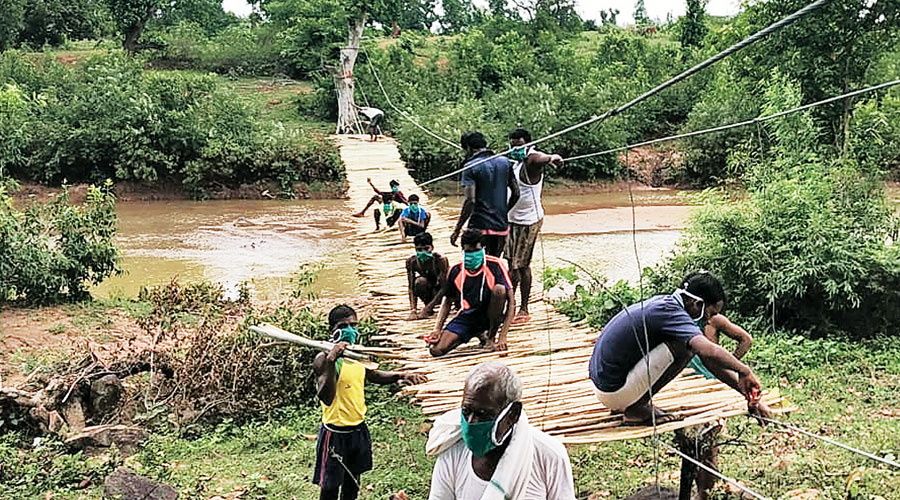Residents of four forest villages in a Maoist-affected region of Jharkhand have learnt the unspoken pitfalls of “atmanirbhar” the hard way.
After 30 years of pleading with government officials and elected public representatives to build a bridge over a rivulet did not yield any result, the residents of Katang, Mari, Kacha and Saliya villages in the Herhanj block of Latehar district took it upon themselves earlier this month to install one themselves.
The villagers, mostly impoverished migrant labourers who returned home after losing jobs during the lockdown, pooled in Rs 10,000 from their meager resources to buy bamboo sticks, ropes and coils to themselves build a rickety 250-metre hanging bridge across the Katang rivulet.
The villagers cross the rivulet on foot at other times of the year, but during the monsoon when the Katang rivulet is in spate, they get almost cut off from the rest of Herhanj block, 110km from state capital Ranchi, and beyond.
Children cannot go to school and many people suffer, even die, due to lack of access to hospitals and medicines, the residents said. They don’t even get daily essentials as those delivering the items avoid taking a detour through difficult forest terrain.
“We had been writing to MLAs, MPs, BDOs and deputy commissioners for the last 30 years for a bridge to be built, but received only verbal assurances that were never
fulfilled. We had also complained to leaders when they came here before last year’s (Assembly) elections (in December). They had promised us that once the elections were over, a work order would be issued for the construction of a bridge. We waited but nothing happened,” said Premchand Oraon, 38, a resident of Katang village who works as a migrant labourer in Bhubaneshwar.
“Our patience ran out when the monsoon arrived in mid-June. We collected whatever money we could and bought coils, ropes and bamboo sticks. We fastened the coils onto trees on either side of the river and built a hanging bridge with the help of sticks and ropes. We have seen such bridges on TV in Rishikesh (Uttarakhand),” he added.
The 5-feet-wide bridge, which will be ready in two-three days, will help villagers reach Herhanj block in less than half an hour during the rainy season.
“We will be able to take the usual 3km route to the block headquarter. It will take us less than half an hour on foot and on cycles. Otherwise, during monsoon when the rivulet is in spate we have to take a detour of over 12km. Such a long cycle ride in this forest terrain takes over two hours and is an arduous journey,” said Prabhat Oraon, 32, a resident of Katang. “We faced immense difficulties in rushing to health centres during medical emergencies and could not get essential commodities during the rainy season as delivery men avoid taking the longer route,” he added.
The government, which has been peddling an atmanirbhar (self-reliant) dream this pandemic and lockdown season, seemed oblivious to the condition of the villagers.
Latehar deputy commissioner Zeeshan Qamar said: “The villages are located in a dense forest. I have asked the BDO to submit a report and we will do whatever is needed to solve their problems.”
He said he had never received any written complaint from the villagers.
Herhanj BDO Sanjay Kumar Yadav said: “The villages are located in a dense forest. I will be able to comment only after reaching the villages tomorrow (Wednesday) morning.”
Latehar MLA and JMM leader Baidyanath Ram said: “I have come to know of the problem and will be visiting the village personally in a day or two to ensure that a proper bridge is constructed at the earliest.”











